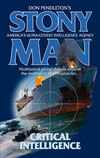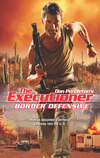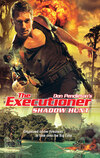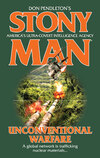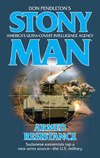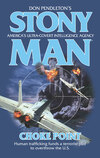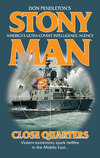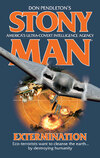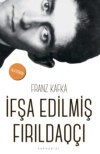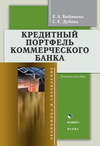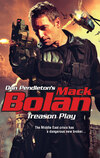Читать книгу: «Critical Intelligence», страница 4
CHAPTER FIVE
Stony Man Farm
The Bronco pulled out of the dirt road emerging from the orchard and came to a stop at the foot of the hill. Doors were kicked open and the five members of Phoenix Force emerged from the vehicle. Gary Manning unwrapped a protein bar and began eating it.
“Good God, Manning,” Calvin James said. “Are you always eating?”
Still chewing, the massively muscled Manning looked at him and shrugged. “I’m in a bulking phase. I want to see how much weight I can put on and still keep my two-mile-run time under eleven and a half minutes.”
“Christ,” Rafael Encizo groused. “If you get any goddamn bigger we’ll never get the helicopter off the ground.”
“Then I’ll just leap to the target in a single bound,” Manning shot back.
Moments later a second SUV pulled up, this one containing Able Team and driven by John “Cowboy” Kissinger.
Kissinger had done time as a DEA agent before coming to work as armorer for the Stony Man operation. When it came to tactical equipment, firearms and explosives, he combined the creative insight of Akira Tokaido and the intense analytical skills of Professor Wethers.
McCarter took a sip of his coffee out of a cardboard cup and looked over at the armorer. Kissinger was laughing in response to something Hermann Schwarz was saying.
“Oh, Christ,” the Briton muttered as Manning strolled up beside him. “Schwarz is telling jokes again.”
The Canadian moaned in response as the two field teams converged. Schwarz kept right on talking, his eyes fairly dancing with delight as Carl Lyons, his favorite target for off-color humor, studiously ignored him.
“You think that’s bad, Cowboy?” Schwarz asked Kissinger. “One time after we got our operational bonuses we went in on a cattle ranch.”
“Oh, man,” Calvin James muttered to T. J. Hawkins, “this is going to be awful.”
“Usually,” Hawkins agreed. Then, momentarily taken back by the outlandishness, he turned toward James. “Wait, did they invest in property?”
“The only property Lyons ever invested in was the stripper pole he put up in his condo,” James replied.
“So we decide to buy this bull,” Schwarz continued. “You know, to increase our stock.”
“Please shut up,” Lyons said, his voice dull with hopelessness. “Can’t we just train?”
Schwarz continued as if he hadn’t heard. “So I go over there and Carl is all down, really bummed, says the bull just eats grass all day and won’t even look at the cows.” Schwarz stopped talking long enough to cut his eyes over to the burly ex-LAPD detective. The man looked resigned and Schwarz’s grin grew. “So I tell him to get a vet out quick to fix the problem. Two weeks later we get scrambled by Barb for a deployment.”
“Where I wished you’d suffered a horrific wound to your mouth,” Lyons added.
“And I ask Carl how things are going and he’s happy as hell! ‘The bull has taken care of all my cows, broke through the fence and has even serviced all the neighbor’s cows!’ I’m all like wow!” Schwarz laughed. “What the hell did the vet do to that bull? ‘Just gave him some pills,’ said Carl. So I’m like, what kind of pills? And Carl looks me straight in the eye—this is no bullshit—and says ‘I don’t know, but they sort of taste like peppermint.’”
Schwarz immediately began laughing at his own joke, folding almost in two with mirth as he guffawed. He looked up and saw the rest of the men from Stony looking at him with flat affects. “What?” he demanded. “He said ‘they taste like peppermint!’ See, he was eating the horny pills.” Out in the long grass, crickets chirped. Schwarz frowned. “These are the jokes, people.”
Rafael Encizo shook his head in pain. “You’ve got a real gift, man.”
“Yeah, he’s got a gift,” Blancanales replied. “He’s got such a gift Hal had to go to the freakin Oval Office to keep the CIA from stealing his jokes to use on the prisoners in Gitmo.”
“Oh, man.” McCarter shook his head. “If the ACLU thought sleep deprivation was torture they would have lost their minds if they’d ever heard Schwarz telling detainees jokes.”
Schwarz stood, his face holding a shocked expression. “You know Jesus said a prophet is never revered in his own land. Now I know what he meant.”
Kissinger burst out laughing in incredulous mirth. “Yeah, Hermann, whenever I think of Jesus I think of you, man.” The armorer stepped forward, shaking his head. “How ’bout I show you guys why I brought you out here before Carl picks up Blancanales and beats you to death with him?”
“Sure.” Schwarz shrugged. “I like new toys as much as the next electronics genius.”
“You can see,” Lyons observed, “he’s as modest as he is funny.”
“Please tell us what you brought,” Manning begged Kissinger.
“Let me introduce you boys to a little bit of gear I appropriated from DARPA by way of our good friends at Lockheed Martin.”
“Jet pack?” McCarter, a pilot, asked, only half joking.
“Close.” Kissinger nodded and led the teams around to the rear of his SUV where he lowered the back hatch. “Exoskeletons.”
“Exoskeletons?” Encizo asked.
Kissinger nodded. “Yep. Called HULC.” He began handing out surprisingly compact packages. “We do the first trial out here on a few hill runs, then I had Hal go through Justice and get us some time at the Marine Corps obstacle course down in Quantico. We’re going to put these mothers through a workout, then see if they’d be any use to you shooters out in the field.”
Hawkins looked at his package. “They call it the Hulk?” he asked.
“No,” Kissinger replied. “Not the Hulk, but HULC, or Human Universal Load Carrier. Just stretch out the legs, then step into the open foot pads. Secure the straps at thighs, waist and shoulders. Supposedly they’ve got it spec’ed out for two hundred pounds at a top speed of ten miles per hour. But you’re supposed to be able to crawl, jump, kneel, squat in it.”
“How does it work?” Schwarz asked, all humor gone as the prospect of new tech was put in front of him.
“Four lithium-ion batteries go into that pouch at the small of your back. They power sensors in the footpads, the microprocessors that read them and move the hydraulic system.”
Lyons frowned while the others began putting on their units. “How quick can we unass ’em if we need to?”
“Once you get the hang of it, the contractor told me under thirty seconds,” Kissinger replied.
“Oh, that’s good,” Schwarz said. He began doing deep knee bends in his combat apparatus. “You see, since he took that medicine I told you about, Ironman’s been real, real concerned with getting his clothes off in a hurry.”
“You got one of these things with a dog muzzle?” Lyons asked. “That could help me out.”
“I’ll see what the boys at DARPA have to say.” Kissinger nodded.
The Stony Man tactical teams secured themselves into the exoskeletons and began warming up the gear. First they paired up and ran a series of sprints up the hill. There was no improved performance, but the HULC tactical system provided surprisingly little hindrance to their speeds.
“What’s DARPA tell you so far, Cowboy?” Manning asked. “It look like Lockheed is going to get the contract?”
Kissinger nodded. “Yep, the boys at JSOC loved ’em. They’re talking that if the test results hold up, they’ll go beyond Rangers and maybe deploy them to general infantry units in the Marines and Army.”
Kissinger lowered the rear gate of the SUV where he had loaded a pallet with training weapons and prepacked rucksacks filled with sandbags. “Let’s start loading you supermen up and see what these bad boys can really do.”
Farmhouse
BARBARA PRICE SAT in the kitchen of the old farmhouse and slowly drank a cup of coffee. In front of her she had a stack of satellite images, an encrypted Kindle DX and a PowerBook logged into A-Space.
A-Space, or Analytic Space, was a social networking and common collaborative workspace for all the members of the USIC, or United States Intelligence Community.
The Stony Man mission controller was using the site to search through the Library of National Intelligence for seemingly unrelated links that formed a pattern.
As a dedicated part of her counterintelligence security measures, Kurtzman’s cybernetic team had been tasked with searching the browser on a rotating basis, making sure no evidence, concrete or oblique, about Stony Man Farm made it onto the site.
Once upon a time in America, great firewalls of competition and compartmentalization mindsets had kept the disparate fiefdoms of the USIC separate from each other. In those days Stony Man Farm had been the main off-the-books weapon of choice by the Executive Branch looking to battle terrorism.
Post 9/11 many things had changed in America. Compartmentalization had gone out of vogue with a vengeance. Other “tip of the spear” organizations like the Joint Special Operations Command and the CIA’s Special Activities Division had seen themselves refocused into areas traditionally deemed off the books and thus the province of Stony Man.
Also intelligence activity oversight committees in the House and Senate had started looking into corners and under rocks that before had remained unmolested. Several high-profile scandals had already rocked the espionage and military communities.
All of those would seem like the high jinks of a naughty PTA president in comparison if the full scope of Stony Man’s operation ever came to light.
The list was endless: extrajudicial killings of foreign nationals and American citizens; violations of federal, state and local laws and statues by the truckload; operations conceived, designed and executed in full and complete violation of the Posse Commitatus Act; war crimes as defined by the Geneva Convention and Uniformed Code of Military Justice. The list stretched out and led up the chain of command all the way to the Oval Office.
Theoretically at least, in several ways the Stony Man operation was many a U.S. lawmaker’s and citizen’s ultimate big brother nightmare. In practicality it was the best defense the nation had ever instituted.
In theory, Price thought wryly of the old axiom, theory and practice were the same. In practice they never are.
She dialed down the Kindle DX screen, scrolling through the digital display of the after-action report CIA interrogators at a black site camp on the island of Diego Garcia had sent back. It continued the results of the interrogation of the North Korean, Sin-Bok.
Most of the information was unspectacular. The agent hadn’t been taken as an investigation tool but rather as a behind-the-scenes warning to Kim Jong-il to not play his brand of lunatic hardball in the Western Hemisphere.
However, something odd had caught Price’s eye. While under a modest dose of sodium thiopenal and slight measures of the euphoric agent lysergic acid diethylamide, the North Korean had babbled merrily on but his answers had been incoherent, often shifting from language to language and even into the random, including rattling off simple mathematical problems.
“‘Three plus four. I’m three plus four,’” Price quoted to herself.
It was abnormal even for a person tripping on LSD. She leaned back in her chair and smelled the fresh air of the Blue Ridge Mountains. She picked up her Montblanc pen, a gift from Hal Brognola, and tapped her chin in a reflexive motion.
On a whim she typed “three plus four” into the search option on A-Space. Found nothing. She shrugged. It had been a wild shot anyway. Perhaps Hunt or Akira could…
“Stupid!” She laughed suddenly.
Leaning forward, she put her pen down with a click next to her ceramic mug of coffee. The keys on the PowerBook tapped rapidly as she typed in the word and hit Enter: “Seven.”
CHAPTER SIX
Kiev, Ukraine
Klegg sat. He didn’t offer to shake hands. Milosevic regarded him with a reptile stare, eyes bloodshot. He watched as the American set the attaché case carefully between them.
Milosevic cocked an eyebrow in question. Klegg smiled slightly and held his hands out in a welcoming gesture. Beside him on the couch Svetlana was completely ignoring him now that her job was done.
She giggled madly as another girl in a brilliant couture dress pulled out a water bong of thin-cut crystal and splashed vodka from a bottle out of an ice bucket into the main chamber. The entourage around them chattered in Russian under the watchful eyes of Milosevic’s bodyguards.
Kiev made Klegg think of what Dodge City had been like during the cattle days or San Francisco during the gold rush; a wide-open frontier town where the law didn’t apply to anyone with money.
Beside him another loose pile of cocaine was casually split across the table as a laughing twentysomething with dragon tattoos on his scrawny arms and a diamond stud in his nose opened a velvet drawstring pouch and dropped buds of deep green colored marijuana into the mix.
“I’m supposed to ask what you want, I know,” Milosevic said in English. “But I don’t like playing twenty questions.”
“Twenty-two pounds,” Klegg supplied for him.
“Twenty-two pounds?”
“Twenty-two pounds,” Klegg confirmed.
“For what?”
“Call it earnest money, for a conversation.”
“Which conversation?”
“The one we’re about to have.”
“Why would you bring me twenty-two pounds to have a conversation? This conversation—” Milosevic leaned forward “—which is starting to become ludicrous.”
Twenty-two pounds was the exact weight of one million dollars in one-hundred-dollar bills.
Beside Klegg, Svetlana had taken a fat, sticky bud and coated it liberally with powdered cocaine and then thumbed it into the bowl of the vodka-filled bong. The giggling mad man with the nose diamond provided a pocket lighter that seemed closer to a butane torch, and the coven huddled around the implement.
“There’s nothing ludicrous here,” Klegg assured him, not without a sense of irony. “I’m giving you that money to listen to my proposal. To consider it seriously. If you say no to what I’m suggesting, fine—you take the money and we part on good terms. But I’m not here to talk real estate or banking or oil futures out of Chechnya.”
Milosevic snapped his fingers and settled back in his lounge chair. The music in the club was deafening but the ballistic plastic surrounding the deck landing muted the sound to a tolerable level.
A muscle-heavy thug with a crew cut and fifty-five-inch chest bent down and picked up Klegg’s briefcase. Beside him Svetlana coughed and a cloud of cocaine-laced marijuana smoke rolled out like smog from a chimney. Immediately, Klegg felt light-headed and he instantly wondered if that wasn’t part of Milosevic’s plan.
“Talk,” the ex-KGB operative said. “You have purchased five minutes in which to interest me.” He lit a cigar. “Frankly, I don’t expect you to succeed.”
“I came here on certain assumptions.”
“Dangerous.”
“It can be,” Klegg conceded. “But risk preempts reward. For example…six plus one equals seven.”
The Russian made a face. If he was surprised he didn’t show it. “Just as five plus two equals seven,” he replied.
“Even my assumptions are grounded in certain…continuities,” Klegg smiled.
Milosevic waved his free hand in a “come on” gesture. Svetlana passed the bong to the girl in the red couture dress.
“The first assumption,” Klegg continued, “is that you retained your contacts from your time in a KGB station house in eastern Africa. That you could, if properly motivated, reach out and reactivate stringers, cells and networks across the region.”
“You must have these kinds of contacts among your own community,” Milosevic countered. “Why come to Ukraine to get what you could get in London or New York?”
On the couches the entourage exploded into laughter and applause as Svetlana and the girl in the red dress began making out.
“Because,” Klegg said slowly, “I need contractors and operatives who don’t mind pulling down on Westerners. I want businessmen, not ideology. For that, it was come here or go to Palermo.”
“Rio, Caracas,” the Russian offered. “Even Uruguay.”
“I go to the cartels, I might as well go to the fucking monkey house at the zoo.” Klegg paused. “Though for what I have in mind, an outer circle of cannon fodder might be appropriate, given an inner cadre capable of dealing with them afterward.”
“A fixer who exercises total unit closure on his field talent tends to have an abbreviated career,” Milosevic countered.
“You’ll land on your feet, I’m sure.”
Milosevic released cigar smoke in a huge plume and settled back comfortably in his chair. His eyes cut over to where Svetlana was making out with the girl from his entourage. The Russian oligarch looked back at Klegg.
“You start tying up loose ends, it can sometimes be hard to know when to stop.”
Now it was Klegg’s turn to shrug. “Tie up the knots that can’t tie you back. Call it acceptable.”
Like a scene out of Faust, Milosevic leaned forward and extended his hand.
IT WAS COLD in the alley outside the Kiev nightclub.
Klegg’s and Svetlana’s breath plumed up between them as they kissed furiously. The American plunged his hands inside the woman’s ankle-length fur coat. Her eyes were glassy marbles as they kissed. He ran his hands over her body underneath her coat, stroking her up to a fever pitch of excitement.
She moaned as his fingers worked at her.
The back door to the nightclub was just a few yards away and the muted sound of the dance beat music rattled the blacked-out windows in their frames. The alley smelled strongly of the urine of drunk and stoned patrons. Garbage overflowed out of battered old cans and three giant green bins.
Rats, braving the frigid chill to get the remnants of greasy food, swarmed across the refuse and watched the humans with glittering eyes.
Though thousands of citizens of Kiev went about their lives within little distance of couple, it was as if they were alone in a vast, urban wasteland of empty windows, rubbish and deep shadows. It called to Klegg’s mind the poem The Waste Land by T. S. Eliot.
“I’ll show you fear in a handful of dust,” the lawyer thought idly. It made no sense but his mind was starting to click with adrenaline.
“Now,” Svetlana whispered in his ears. “I want it now.”
“Now?” Klegg asked, his heart starting to beat even faster.
“Yes, yes,” she breathed.
“Okay.” He laughed. “But remember, you asked for it.”
The American psychopath stepped back from the Russian woman, leaving her gasping. Her glassy, red-veined eyes opened in confusion.
Klegg grinned like a maniacal clown.
His hands went to the small of his back underneath his coat. He emerged with a pair of nunchaku.
The martial-arts weapon was designed from the width of a single, slightly thicker than average handle cut smoothly down the middle, allowing for more compact and thus easier surreptitious carrying. The handles on the thicker edges were octagonal, presenting a variety of sharp edges for contact when swung.
“My favorite movie when I was growing up was Enter the Dragon,” Klegg explained, speaking fast as his breath continued coming harder and faster. “Nylon cord and teak wood. I walked right through airport security with this.”
He assumed the rear defense stance. Dramatic, almost cinematic in nature, with most of his weight resting on his outstretched forward leg while his torso was held back, arms up, nunchaku held along the outside of his right arm.
“W-what?” Confusion. The beginnings of fear.
“I’m not going to lie,” Klegg snorted. “I like this weapon ’cause it’s so fancy. Does a lot for my self-esteem.”
He exploded into motion, whipping the segmented clubs around through an intricate pattern of moves: reverse shoulder swing into a figure-eight swing, down into an underarm grip.
He was grinning so wildly now his smile threatened to split his face. He forcefully exhaled and performed a cross-back swing too fast for the eye to follow, and Svetlana, at last understanding what was about to happen, opened her mouth to scream.
The end of the nunchaku whipped around and slapped the woman across the jaw. Her head snapped to the side and her scream was cut short by the impact. Blood painted the dirty snow in stripes of scarlet. She stumbled back, long heels sliding on the icy ground, only the alley wall keeping her up.
Klegg, eyes burning, moved in, the nunchaku cycloning through its figure-eight pattern. He struck her again, then caught the stick under his arm on the rebound. Her head snapped back and this time teeth flew like tumbling dice.
She sagged to her knees and her ruined face poured blood out in a hot, sticky puddle beneath her.
Klegg lashed out again and again. His skill was not simply that of a choreographed dancer; he could swing the arcane weapon with deadly force. The teakwood handle made sickening crunching sounds like cracking ice as it slapped into Svetlana’s skull and jaws over and over.
Blood splatter painted the walls, painted the ground, soaked the woman until her face was a mask of it. She couldn’t find the strength to scream, couldn’t drag in enough air to cry out before she was struck again.
She could only whimper.
Klegg’s smile was a horrible rictus on his gleaming face. His breath came in short, hard pants like a man having sex. The concussive shock of each blow traveled back up his arm with each strike.
Finally one of the octagonal edges of the striking club caught the ravaged woman a glancing blow along her temple and she was knocked unconscious. She sagged face-first to the ground, still as a slaughtered carcass. Klegg struck the back of her head two hard snaps and more blood matted her once silky hair.
Gasping for breath, he moved around behind her and took each side of the nunchaku in an underhand grip. He bent and looped the nylon cord under her chin then twisted. He twisted until he felt her larynx crumple like an empty soda can under his heel and he rose, dropping the weapon to lie beside Svetlana’s rapidly cooling corpse.
He took off his gloves and ran a hand through his hair. He straightened and smoothed his overcoat. He reached down and adjusted his still prominent erection in his slacks.
Without hurry he lit a cigarette and blew smoke out in twin streams from his nostrils. Slowly his heart slowed and his breathing calmed. His erection began to fade.
He smoked half the cigarette down, then dropped it to the ground. It landed in a sludgy pool of snow and blood, instantly extinguished.
He turned and walked calmly from the alley to hail a taxicab. He had no fear of the police. Kiev was a wide-open, dirty city and he was under the protection of Milosevic, the biggest villain of them all.
Things were working out just right, he decided.
Stony Man Farm
BARBARA PRICE sat at her desk in the Annex.
She had three computer screens open in front of her, each with a spreadsheet showing expenditures for separate areas of the Stony Man operation. She had itemized ledgers for the armory, for Transportation and for Buck Greene’s security projects. Requisition forms for jet fuel alone were enough to make clerks from the Governmental Accountability Office gray with shock.
Price looked at the tally and shook her head as she typed in her authorization code.
The public was always in some outcry about thousand-dollar hammers or eight-hundred-dollar toilet seats. The truth was the number crunchers at the GAO would never have made such oversights. Those inflated purchase orders were designed to hide covert-action expenditures for clandestine units and projects just like Stony Man.
There was a knock on the office door and she looked up. Carmen Delahunt stood in the entrance, a tired look on her face and a manila file folder in her hand.
“Got a second?” the redhead asked.
Price pushed herself back from her desk. “Sure,” she said. “What’ve you got?”
“Multiples of Seven.”
“Really?” Price arced an eyebrow.
Delahunt entered the room and took a seat across from Price at the desk. She laid out her folder showing several computer printings and a couple of glossy jpg enlargements.
Delahunt began leafing through them, talking fast, the way she always did when she was onto something.
“I started cross indexing intelligence estimates and after-action reports like you’d asked,” she explained. “Looking to see if anything relating to Seven came up.”
“You found something?”
“I found a motherlode, Barb. I’ve got Seven cross-indexing things going back decades. Some of it can’t be related—the search is too broad, but you’ve tapped into some kind of thread here. Pieces from a thousand different puzzles that nobody realized they were even supposed to be looking at.”
Price leaned forward, caught up in her enthusiasm. She reached across the desk and pulled a codex Delahunt had printed up. Her vision swam as she saw some of the events and people highlighted.
Kabul urban police. Princess Diana. Baghdad Green Zone. Kiev. Israel, 1968. CERN. The Vatican. Charles Lindberg. Hangar 21. White Sands, New Mexico. Ho Chi Minh City. Aldrich Ames. There was such a collage of information it was impossible to make sense of.
The list went on.
“As interesting as these initial surveys are, they’re basically cold cases,” Delahunt continued. “Some much less cold than others, but for now, cold cases.” She paused. “Except for this.”
Price looked up from the codex. “What?”
“Canada.” Delahunt slid a paper-clipped report to Price. “Toronto.”
“Give me the through line.”
“Our Department of Energy runs a contract research facility there. Ostensibly to study alternative fuels. Green tech, stuff like that. From what I’ve gathered, though, much of the science is a little more experimental. A little more theoretical.”
“And?”
“And the DOE put in a request to the FBI last week to conduct a counterintelligence operation on the facility as internal security had started reporting recruitment approaches being made on their employees by unknown operatives looking to do pay-for-play deals. Also, electronic countermeasures had been tripped in the last forty-eight hours indicating someone was doing a hostile analysis of their hard site security.”
“Standard Bureau stuff.” Price nodded. “Could be anyone looking to see what goodies are being cooked up. Hell, it could be industrial even, not political.”
Delahunt nodded. “Still could be. Nothing’s been proven. However the FBI team they sent to Toronto managed to catch a glimpse of someone seen surveying the employee entrance.”
“Custody?”
“No.” Delahunt shook her head. “This wasn’t a joint op with the Canadians. They took his photo and requested RCMP help with digital analog forensics.”
“They ID the guy?”
“Sure. Man named Jen Duh sh Tyen Tsai.”
“If Schwarz were here you’d know he’d say—”
“Gesundheit,” Delahunt agreed. “He’s a funny man that Hermann.”
“Yeah, but looks aren’t everything.”
“You got that from him, didn’t you?”
Price took a sip of coffee and shrugged. “Sometimes he’s funny. Mostly he’s just funny ’cause he’s trying to be funny and fails.” She set the mug of coffee down. “But surely Mr. What’s-his-name doesn’t go by that handle.”
“Mostly just Jen.”
“What do we know about him?”
“We know he’s in Toronto. We know he’s a sort of free agent between Chinese Tong running underworld activities there. Part courier, part outside hit man, part information broker.”
“So a criminal mercenary with connections to Chinese syndicates is running a surveillance operation on a DOE private contractor facility. And you tied him in to Seven how?”
“Look at his sleeve.” Delahunt gestured toward a RCMP file photo. “His left arm, inside, above the elbow.”
A “sleeve” was a slang term used by tattoo enthusiasts to indicate an arm that was entirely covered by ink designs from deltoid to wrist. Jen Tsai’s was covered in swirling images of Chinese characters, mythological demons and iconography in bold reds, blues, yellows and black.
“Where? I don’t see…” Price trailed off as she scrutinized the photo. “Ah.”
Just above Jen Tsai’s elbow was a horned demon skull, screaming mouth lined with fangs. Flames swirled inside the gaping jaws, and in the center of the flames were the numerals 1+6=7.
“Yeah,” Delahunt agreed. “Little odd for a hardcore Chinese gangster to be sporting primary arithmetic in his colors, no?”
“Oh, yes,” Price answered.
“We have his probable twenty?”
“We most certainly do.”
Price picked up her coffee mug. “Good. I’ll call Hal have him pull the Bureau boys off surveillance. Then I’ll send Able Team around to knock on some doors.”
“Knowing Ironman, it’ll be heads that get knocked more than doors.”
Price shrugged. “Whatever…”
Бесплатный фрагмент закончился.
Начислим
+10
Покупайте книги и получайте бонусы в Литрес, Читай-городе и Буквоеде.
Участвовать в бонусной программе
